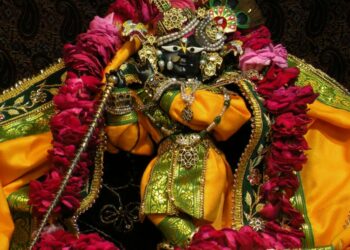TEXT 25
daivam evāpare yajñaṁ
yoginaḥ paryupāsate
brahmāgnāv apare yajñaṁ
yajñenaivopajuhvati
SYNONYMS
daivam—in worshiping the demigods; eva—like this; apare—some others; yajñam—sacrifices; yoginaḥ—mystics; paryupāsate—worship perfectly; brahma—of the Absolute Truth; agnau—in the fire; apare—others; yajñam—sacrifice; yajñena—by sacrifice; eva—thus; upajuhvati—offer.
TRANSLATION
Some yogīs perfectly worship the demigods by offering different sacrifices to them, and some offer sacrifices in the fire of the Supreme Brahman.
PURPORT
As described above, a person engaged in discharging duties in Kṛṣṇa consciousness is also called a perfect yogī or a first-class mystic. But there are others also, who perform similar sacrifices in the worship of demigods, and still others who sacrifice to the Supreme Brahman, or the impersonal feature of the Supreme Lord. So there are different kinds of sacrifices in terms of different categories. Such different categories of sacrifice by different types of performers only superficially demark varieties of sacrifice. Factually sacrifice means to satisfy the Supreme Lord, Viṣṇu, who is also known as Yajña. All the different varieties of sacrifice can be placed within two primary divisions: namely, sacrifice of worldly possessions and sacrifice in pursuit of transcendental knowledge. Those who are in Kṛṣṇa consciousness sacrifice all material possessions for the satisfaction of the Supreme Lord, while others, who want some temporary material happiness, sacrifice their material possessions to satisfy demigods such as Indra, the sun-god, etc. And others, who are impersonalists, sacrifice their identity by merging into the existence of impersonal Brahman. The demigods are powerful living entities appointed by the Supreme Lord for the maintenance and supervision of all material functions like the heating, watering and lighting of the universe. Those who are interested in material benefits worship the demigods by various sacrifices according to the Vedic rituals. They are called bahv-īśvara-vādī, or believers in many gods. But others, who worship the impersonal feature of the Absolute Truth and regard the forms of the demigods as temporary, sacrifice their individual selves in the supreme fire and thus end their individual existences by merging into the existence of the Supreme. Such impersonalists sacrifice their time in philosophical speculation to understand the transcendental nature of the Supreme. In other words, the fruitive workers sacrifice their material possessions for material enjoyment, whereas the impersonalist sacrifices his material designations with a view to merging into the existence of the Supreme. For the impersonalist, the fire altar of sacrifice is the Supreme Brahman, and the offering is the self being consumed by the fire of Brahman. The Kṛṣṇa conscious person, like Arjuna, however, sacrifices everything for the satisfaction of Kṛṣṇa, and thus all his material possessions as well as his own self—everything—is sacrificed for Kṛṣṇa. Thus, he is the first-class yogī; but he does not lose his individual existence.
TEXT 26
śrotrādīnīndriyāṇy anye
saṁyamāgniṣu juhvati
śabdādīn viṣayān anya
indriyāgniṣu juhvati
SYNONYMS
śrotra-ādīni—such as the hearing process; indriyāṇi—senses; anye—others; saṁyama—of restraint; agniṣu—in the fires; juhvati—offer; śabda-ādīn—sound vibration, etc.; viṣayān—objects of sense gratification; anye—others; indriya—of the sense organs; agniṣu—in the fires; juhvati—they sacrifice.
TRANSLATION
Some [the unadulterated brahmacārīs] sacrifice the hearing process and the senses in the fire of mental control, and others [the regulated householders] sacrifice the objects of the senses in the fire of the senses.
PURPORT
The members of the four divisions of human life, namely the brahmacārī, the gṛhastha, the vānaprastha and the sannyāsī, are all meant to become perfect yogīs or transcendentalists. Since human life is not meant for our enjoying sense gratification like the animals, the four orders of human life are so arranged that one may become perfect in spiritual life. The brahmacārīs, or students under the care of a bona fide spiritual master, control the mind by abstaining from sense gratification. A brahmacārī hears only words concerning Kṛṣṇa consciousness; hearing is the basic principle for understanding, and therefore the pure brahmacārī engages fully in harer nāmānukīrtanam—chanting and hearing the glories of the Lord. He restrains himself from the vibrations of material sounds, and his hearing is engaged in the transcendental sound vibration of Hare Kṛṣṇa, Hare Kṛṣṇa. Similarly, the householders, who have some license for sense gratification, perform such acts with great restraint. Sex life, intoxication and meat-eating are general tendencies of human society, but a regulated householder does not indulge in unrestricted sex life and other sense gratification. Marriage on the principles of religious life is therefore current in all civilized human society because that is the way for restricted sex life. This restricted, unattached sex life is also a kind of yajña because the restricted householder sacrifices his general tendency toward sense gratification for higher, transcendental life.




















